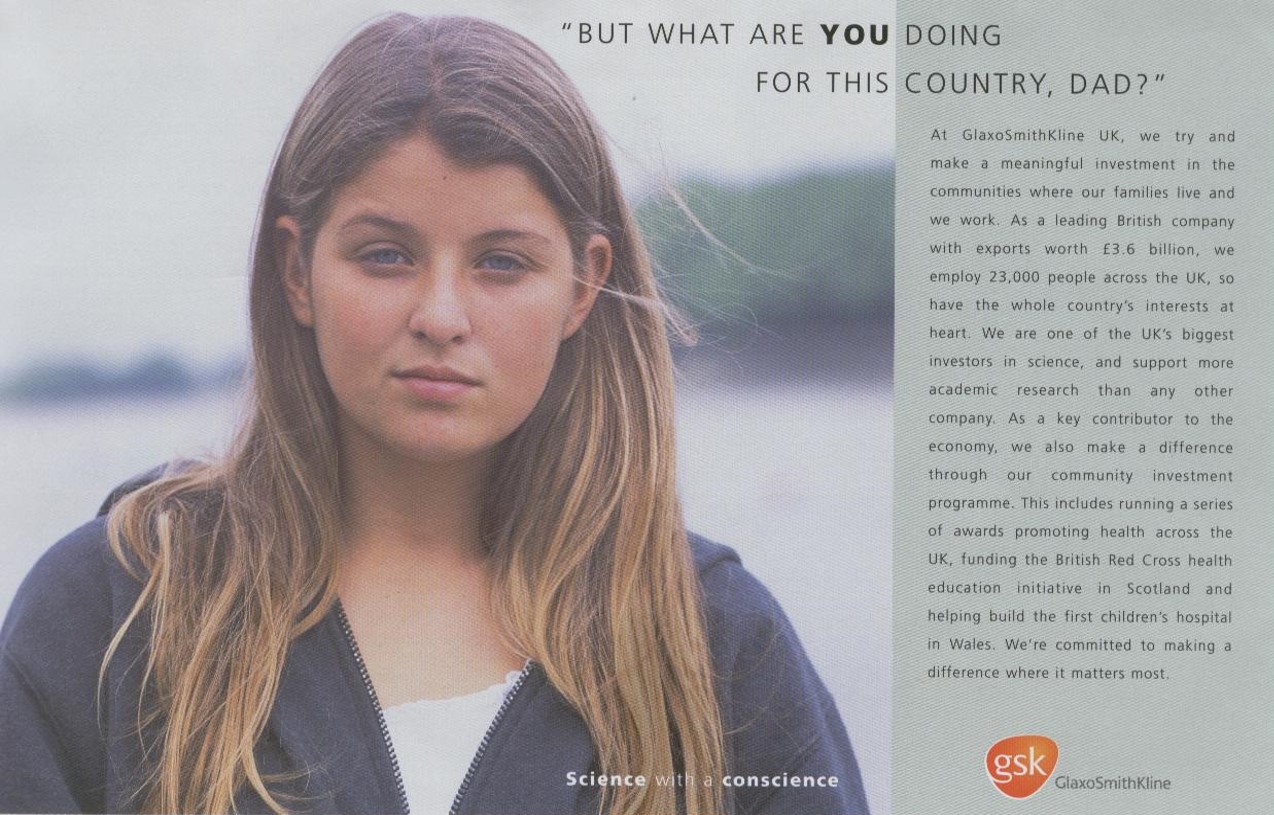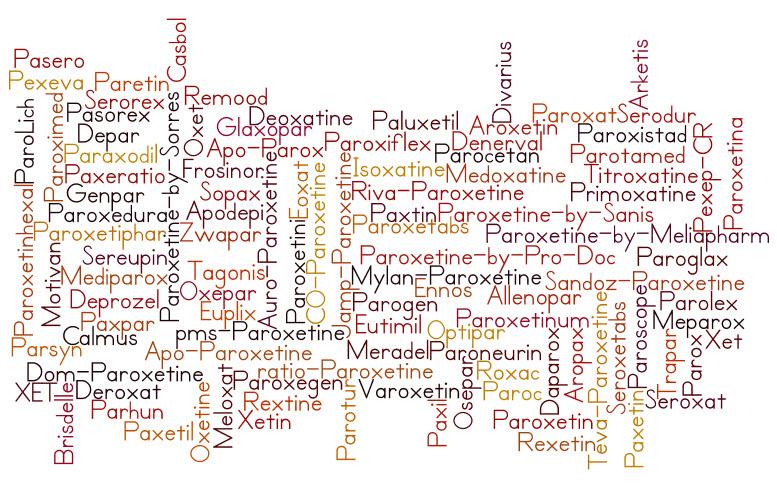Study 329 is probably the most famous clinical trial ever. It is one of the few to attract a Fraud action and is certainly the only one with a $3 Billion fine linked to it. (See A Milestone in Drug Safety.)

The study began recruiting adolescents to Paxil, imipramine or placebo in 1994 and finished up in 1998. Later in 1998, SmithKline Beecham, the marketers of Paxil (they hadn’t discovered it), acknowledged in an internal document that the study had shown that Paxil didn’t work for Children. This lack of benefit was something they were not inclined to share with the outside world. Instead they decided then they would pick the good bits out of the study and publish these.
The good bits led to a publication in 2001 – Keller and 21 others – in the Journal of the American Association of Child and Adolescent Psychiatry, which boasted that it was the journal with the highest impact factor in child psychiatry.
The authorship line was KoL-to-die-for-country.
At the time most of us were still innocent. Few would have guessed that no one on the authorship line might have had any meaningful input to the paper. Few would have guessed that none of the “authors” except perhaps the company personnel had seen the data.
The real author in the sense that most people in street would recognize as authorship was Sally Laden. The study made Sally perhaps the most famous medical writer ever. But even she had not seen the data.
This is a woman who concedes that “There are some data that no spin can overcome.” Not having access to the data may make it easier in tricky cases.
The Keller and 21 others paper was published in July 2001. A month previously the Tobin trial in Cheyenne Wyoming returned a verdict against GSK (formerly SKB) and Paxil in a multiple homicide-suicide case.
The Tobin verdict and the facts that GSK was then the biggest pharmaceutical company in the world, and was notionally based in Britain, and that Paxil was the biggest selling antidepressant in the world, engaged BBC’s leading investigative program, Panorama.
Up till then, in 50 years, Panorama had never repeated a topic but they made four programs about Paxil – Seroxat,
- The Secrets of Seroxat – or The Perils of Paxil – take your pick
- Emails from the Edge
- Taken on Trust
- The Secrets of the Drug Trial
All the programs are available on Study329.org along with their transcripts.
At the heart of these programs was Shelley Jofre who showed that you don’t need medical expertise to sift the wheat from the chaff of most medical studies. She read the Keller paper within weeks of its publication and immediately smelt a rat.
The rest is a history that will reach a major landmark around September 14th when BMJ publish Restoring 329, a year after it was submitted to them and two years after work started on the Restoration.
The Panorama programs are now available on Study329.org.
As is The Famous Grouse lecture which covers the History of 329 and the Black Box Warnings.
Yet more will be added over the next few weeks.
The BMJ paper, when published, will sit there alongside the Keller and 21 others paper.
Mickey Nardo – 1boringoldman – one of the authors of the Restoration will be have a series of posts linked to the publication outlining how and why we cannot afford to glaze over when experts mention clinical trials – RCTs. We need to grab our chance for a Shelley Jofre moment with both hands. His posts will in addition be reproduced here.
The posts here and later on RxISK.org are available for comment and there is a contact us button on Study 329.org.
















Its disheartening to think that after all of this, Paxil is still being prescribed.
Indeed the medical/ psychiatric model of treatment in the United States, has at its foundations the prescribing of so called medicine like this. Its not really about helping people at all. Its primarily a business model, with slick marketing that brings in unbelievable profits, despite the fact that it has little to offer in real treatment to anyone.
To effectively challenge the therapeutic benefit of these medications, would be to shatter a trillion dollar industry. One with all the resources that a trillion dollar industry can muster, including disinformation campaigns against reform, the outright buying of political influence, and the sanitizing of high profile murder cases involving psychiatric drugs to prevent public awareness of how they trigger manic related homicidal rampages.
It is an industry that has destroyed millions of lives, with false promises, based on fraudulent treatments, by denying care, to suffering people, turning them into drug addicts instead.
The bottom line is they just don’t really care how many people they kill, or drive crazy as long as they are making a buck, and the general public doesn’t become aware of the truth.
Report comment
That’s the whole problem. They use fraud to push their wonder drugs through the FDA and when later on research shows that they are ineffective and sometimes straight out harmful – they pay a fine, which is always small compared to the amount of money made. And the drugs are allowed to stay on the market as if nothing happened. There should be a more effective fine system for pharma (you’re convicted – you pay a fine plus all the profits you’ve made on the fraud like normal people). There should be a better mechanism to take the drugs off the market after fraud like that has been exposed and one which takes into account the fact that some people will need the drug longer because of withdrawal issues. Make pharma pay for damages. And of course change the system in such a way that fraud is close to impossible to begin with. It’s a nice wishlist but the current corrupt system makes it only a dream.
Report comment
Yes your right, the system is fraudulent and criminal, and the only thing that matters is how much money it makes.
Report comment
http://yournewswire.com/whooping-cough-caused-by-vaccine-officials-forced-to-admit/
Report comment
Yep 3 billion fine because their mumps vaccine trials were frauds, now proven their pertussis vaccine is causing outbreaks of pertussis…. and even fully vaccinated with no symptoms, are spreading it…. Newborn babies infected by their on mothers (carriers)…. real immunity is a life long immunity, nd this immunity is passed to infant in breast milk, with this vaccine which I call Merck Murder, mothers immunity des not pass to baby…. outcome? Nothing, still pushing the MMR and the DTap on every child, in Australia, why????????????
Report comment
As Macchiavelli said, “The ends justify the means,” and “Those who deceive will always find those who allow themselves to be deceived.”
It’s ironic how the advertisement said, “As a leading British company with exports worth $3.6 billion, employing 23,000 people across the UK, we have the whole country’s interests at heart.” This spuriously implies a link between corporate success and having the public interest at heart.
The line should have read, “Our global reach allow us to effectively prey upon an increasing number of people, causing long-term disability and contributing to early death for many. This collateral damage is unfortunate, but it’s only business. We are like the tobacco companies of the 1960s and the scorpion that killed the frog as it crossed the river. We do what it’s in our nature to do. We are amoral sociopathic opportunists – we profit at whatever cost necessary.”
It must be repeated that the “illnesses” like depression supposed being studied in these trials are not real illnesses, therefore the validity of these studies should have been called into question on that count also.
And does anyone know how months or years these trials followed up client outcomes? Or was it the normal pathetic assessment of symptom control over only a matter of weeks. ..
Report comment
Bpdtransformation – I really like the way you write. It really makes my day to read some wonderful sarcasm ;P.
Report comment
Ok so now I read more about the 329 study and found out that it followed people for a grand total of 8 weeks!
So dulling down people’s feelings for a few weeks legitimizes a pill to “treat” life problems that have taken a lifetime to develop. I’m surprised this story never appeared on late night comedy. How pathetic are the psychiatrists who take this kind of “research” seriously… You have to laugh at these poor guys.
Thanks B, making fun of psychiatric studies is entertaining, although it’s not hard because what most psychiatrists say about diagnoses and medications is at best misleading and distorted, and usually outright trash.
But I would also like to do more to create positive change and have a new vision of emotional distress and recovery. It’s gratifying and easy to criticize the pathetic pontifications of psychiatrists, but that alone doesn’t make positive change, as in this case where exposing this 329 study won’t provide a new approach to depression or anxiety. Part of the change I want is making more people aware that there is a better way to think about life problems outside of the disease model. And I do that as much as I can.
Another part is more heavily researching better person-focused approaches to life problems like peer support and psychotherapy. I wish there were a lot more money devoted to this, because if person-to-person, non-label, non-medication approaches to distress turned out to be better than medication – as they inevitably would over long periods – that would serve the dual purpose of raising awareness and providing an alternative. An interesting question is how to get more money devoted to this type of research – perhaps how to create more incentive in various ways for professionals and companies to build long-term approaches to emotional problems that work in the longer term – and I am not sure how that can be done. Wouldn’t it be great if a billionaire would start funding this type of research, rather than BS “research” into false diagnoses and brain/gene scans?
Report comment
Love this ” the line should have read, “Our global reach allow us to effectively prey upon an increasing number of people, causing long-term disability and contributing to early death for many. This collateral damage is unfortunate, but it’s only business. We are like the tobacco companies of the 1960s and the scorpion that killed the frog as it crossed the river. We do what it’s in our nature to do. We are amoral sociopathic opportunists – we profit at whatever cost necessary.”
Report comment
It would be perversely funny, and honest, if GlaxoSmithKline came out with an ad saying that. Probably anti-psychiatry advocates would be blamed for hacking into their computers.
The way these drug companies operate makes me think of the closing scene when Bryan Mills confronts the kidnapper in the movie Taken. I can’t remember the words exactly but it goes something like this:
Bad Guy: “Let me tell you something, Mr. Whoever-You-Are… this is a business… kidnapping your daughter, it was all business…. please understand, it was nothing personal.”
Liam Neeson: “It was always personal with me.”
Report comment
“please understand, it was nothing personal.”
This is kind of triggering. What a psychopath says to a victim just before he/she is about to do some incredible damage.
Report comment
The pharmacutical industry, and all corporations, are legally required to behave only in the best interests of their stock holders, not their customers, nor those they purport to “educate.”
https://m.youtube.com/watch?v=oOafbpaVw90
And they have abided by the law, and behaved as complete psychopaths. Including producing tons of fraudulent science, egregiously misinforming the mainstream medical community and public, resulting in “proper” treatment by the mainstream medical community being the number three or number one cause of death in the US depending on the source, and likely with the same appalling results in much, or all, of western civilization.
Just as the formerly respectable banking industry was morphed into a bunch of nest egg and home stealing ‘banksters,’ the medical community has been turned into an industry of unrepentant murderers. But the pharmacutical corporations were doing what they have been given the legal right to do, according to the laws of our countries.
And who is to protect the people? Technically, that’s the governments’ job. But they all, long ago, were apparently bought off by the “evil banks and corporations” Thomas Jefferson forewarned the American people about long ago.
http://www.monticello.org/site/jefferson/private-banks-quotation
I hope, at some point, the medical community at large will choose to stop trying to just protect itself, by advocating belief in the fraudulent science behind the psychiatric industry because that industry has historically, and still today, existed to aid in the “social control” function of covering up easily recognized iatrogenesis for the mainstream medical community.
And as a society, we are wildly stupid to have handed over control of our world, to corporations that are legally required to behave as psychopaths. The governments need to work together to break up the “too big to fail” banks and corporations, before these psychopathic entities legally destroy all of humanity.
Report comment
I agree, more regulation within healthcare, especially mental health care, would be good. America is the global leader in creating fraudulent, useless, and harmful approaches to emotional problems (“mental illness”) partly because of the lack of government regulation and lack of accountability measures for corporations.
Report comment
I don’t completely agree, the real problem is the bankers and corporations that took over this country’s government in recent decades – who got rid of the Glass Stigel Act and inacted other deregulation. They are the same “too big to fail” European and American banking / corporate families who funded both sides of WWI and WWII, and advocated undue belief in the “mental illnesses” back in Nazi Germany. But when you look at history, the psychiatric establishment’s goals have always been evil, so the psychiatric establishment, although merely minions of these banking / corporate elite, truly are to blame also. The truth is America has been taken over by the global “warrior elite.”
Report comment
Ok I agree with most of your thinking. Although I think the psychiatric establishment acts more like an amoral predator, not someone who’s evil in the cruel sense of that word. In this sense psychiatrists are no more evil than the wolves who steal a farmer’s sheep; the wolf just needs to eat.
In an analogous way, most psychiatrists don’t care or even realize at a conscious level that they promote falsehoods about psychiatric diagnoses and the effectiveness of drugs, and that they often ruin people’s lives in the long term. Their goal is to profit from “treating” their fellow humans. Maintaining the myth that what they’re doing is good, via denial, avoidance and projection, is a necessary cognitive defense to maintain their status and wealth.
Also, many psychiatrists I’ve come across are truly ignorant and uncurious, if that is a word. They simply don’t realize or understand, or don’t care to understand, that the whole belief system founded around psychiatric diagnoses and medication is unscientific garbage.
Report comment
“…more regulation within healthcare, especially mental health care, would be good.”
No, it would not. More free choice and opportunity to select the care one desires would be good. As it stands, only those with resources can arrange for optimal care (holistic, nutritionally based, therapeutic). I would voucherize the system so that everyone, homeless vets, foster children, wards of the state, everyone, can choose the provider and the care.
Report comment
Maybe I was not clear. I agree that it’s highly desirable to have more free choice and opportunity to select a range of “treatment” including the options you mentioned.
When I said regulation, I wasn’t referring to the consumer, but rather to the drug companies. Regulation to make it harder to distort research findings, regulation to impose real criminal punishments for those companies and psychiatrists revealed to be doing harm, and regulation/incentive to promote more research into a broader spectrum of treatment options is what I had in mind. The free market is not working well with the drug companies, since they use their relative freedom to profit, using lies and distortions to hide the damage their mostly ineffective treatments do to clients.
Report comment
Hi bdtransformation BA,
It’s not just the Psychiatrists that prescribe the SSRIs, it’s the GPS as well – and it’s difficult for doctors to acknowledge that these drugs are more or less useless as medicine, but that they kill people.
I think that everybody might need to have some depression or crisis at some stage in life to wake up to where they are.
Report comment
BBC Suicide-Risk Behaviour Patterns Identified – Study
(August 30, 2015)
http://www.bbc.co.uk/news/health-34101608
For Example:
“… reckless driving ….psychomotor agitation …pacing …
impulsivity …”
Report comment
No sh*t Sherlock. Suicidal people more likely to be impulsive to agitated. Wow…
Btw, this is the most useless set of behaviours to predict anything I’ve ever seen, maybe save for “breathing and moving their eyeballs”.
Report comment
“The free market is not working well with the drug companies, since they use their relative freedom to profit, using lies and distortions to hide the damage their mostly ineffective treatments do to client.”
And who enables this profiteering and corruption? We might start with our legislators who have allowed direct consumer advertising of pharmaceuticals. Why did they do this? Hint: it is not a First Amendment issue (the First Amendment was not a barrier to the banning of cigarette advertising). Big Pharma’s ubiquitous and relentless promotion of its wares makes it very difficult to get out the true story, because the mainstream news media, even the so-called investigative reporters, will not touch the ssue for fear of losing their advertising revenue. The self-imposed news black-out means that it is that much harder for the public to become informed. Government regulation to the rescue? By the very people who have allowed the status quo and who now propose to gift us with Murphy’s Bill? Who promulgated guidelines (e.g., low fat diet) that turned out to be wrong? The FDA is OK with the drugging of children; some regulator. You also overlook the fact that, deep down, the government might like the option of drugging people as a means of social control. The late, unlamented Soviet Union did it to dissidents who spoke truth to power. I am not naive enough to suppose that this could not happen here….you think our elected officials would like to be held accountable by people who think for themselves and are not easily manipulated?
Who regulates or checks on the regulator? Ultimately, there is only one answer. It should be “we the people.” The Nestle boycott a while ago (triggered by outrage at the multinational company’s methods of marketing infant formula in Africa) showed that the market power of informed consumers can make a difference. But if too many of us are clueless, indifferent, callous, or afraid to speak out, well, that gives Big Pharma the opportunity to “influence” policy. I would rather rely on my freedom to try to educate people, one at a time. I take some comfort from the fact that consumer sentiment and momentum are shifting away from allopathic (pill-pushing) medicine. Although mental health presents its own special challenges, I see a lot overlap between mental and physical conditions (e.g., inflammation, gut problems) and healthy healing options (diet, exercise, nutrients, earthing) help both.
Report comment
I agree with what you are saying here, GetitRight. Thanks.
Report comment